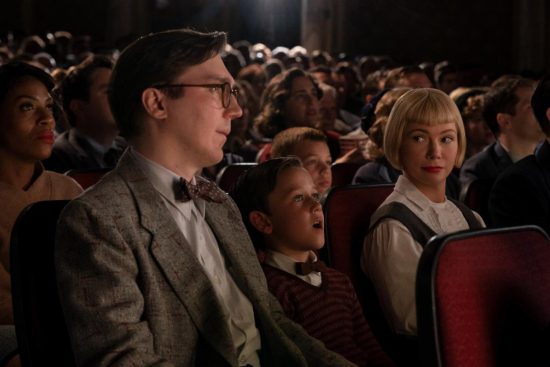TIFF 2022 Review: The Fabelmans – “A love letter to cinema”

Photo credit: Merie Weismiller Wallace/Universal Pictures and Amblin Entertainment
In 1952, a young boy is being taken to his first movie. And he’s scared. He doesn’t know what to expect. He doesn’t like the dark and the crowds. His parents reassure him with promises of acrobats and circus fare, but as he sits in that seat and watches Cecil B. DeMille’s The Greatest Show on Earth it is a train wreck that stays embedded in his mind. Six-year-old Sammy Fabelman remains in a state of awe, and quickly decides that for Hanukkah he wants a train to try and re-create what he saw on screen with the help of his father’s camera. “Movies are dreams,” says Sammy’s mother Mitzi (Michelle Williams), without knowing that her son will go on to create so many of them.
The Fabelmans continues to show Sammy grow and develop as a filmmaker, even when his editing reveals a secret involving his dad’s best friend Bennie (Seth Rogen) which may tear his family apart. And of course, Sammy is a fictional stand-in for a young Steven Spielberg. The entire film is based on his childhood, from that first movie experience in New Jersey, to Arizona and then to Northern California where he spent some high school years. Yet keeping the film ‘fictional’ allows for artistic license in the daunting task of remembering one’s past. Memories that over time become blurred. It is indeed a ‘fable’ based on his life, a Hollywood version with all the cinematic glory of such, captured beautifully by frequent Spielberg cinematographer Janusz Kaminski.
The Fabelmans has plenty of references for fans of Spielberg’s work to enjoy – moments from the director’s childhood that can be seen to help influence future films, such as E.T and Indiana Jones. As much as the film is a love letter to cinema and the joy of movie-making, it’s also a relatively straightforward family drama and coming-of-age story with a stellar cast that makes each character feel rich and vibrant. Yes, Williams is wonderful as Mitzi (though as much as people are talking about her, I don’t feel it’s her best ever performance) but as an ensemble, there are no weak links. In particular watch for Judd Hirsch as a visiting uncle to steal the show for his short time on screen.
There is a lot of life to pack into 151 minutes, but Spielberg’s pacing is deliberate and attentive. It’s never rushed, yet never boring and never feels self-indulgent. Making essentially an autobiographical film it would have been easy for Spielberg to make things overly sentimental, something his critics often comment on, but as vulnerable as he is in this film, it never crosses the line into the saccharine. I for one, have always appreciated the emotional, human aspect Spielberg brings to his films, and it was hardly avoidable in this, his most personal work. This film is the stronger for it.
In the movie, Burt tells a young Sammy, “You can’t just love something. You have to take care of it.” And that’s just what Spielberg has been doing with cinema for decades. He’s been taking care of it, nurturing it, propelling it forward for future filmmakers and audiences alike. How privileged we are that in The Fabelmans we can see this childhood seed of creativity taking shape in the medium he himself has so essentially influenced.










